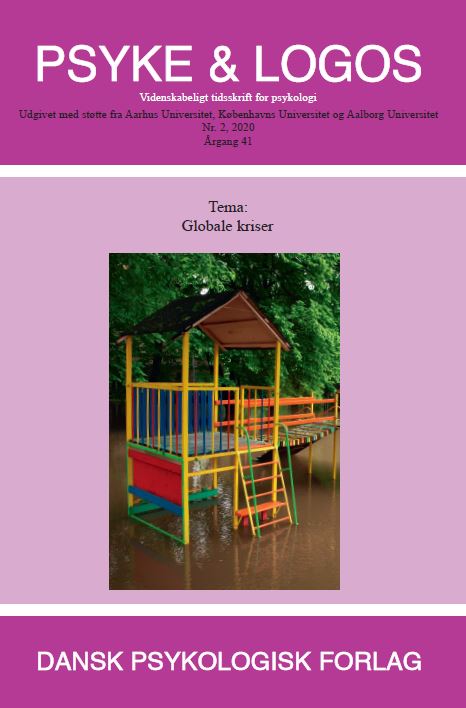Climate change as an existential challenge: Exploring how emerging adults cope with ambivalence concerning climate-friendly food
DOI:
https://doi.org/10.7146/pl.v41i2.127498Nøgleord:
Klimaforandringer, Klimaadfærd, Eksistentiel teori, AmbivalensResumé
This article focuses on the existential aspects of global climate change. Pessimism regarding this problem seems to be particularly common in emerging adulthood (the late teens and twenties). Research also shows that many in this age group feel ambivalent about different pro-environmental behaviors and that ambivalence is a disincentive to behave in an environmentally friendly way. This article’s aim is foremost theoretical, with a focus on living with ambivalence in a more or less “unsustainable” society that simultaneously puts pressure on the individual to live in a sustainable manner. Deploying existential theories and theories about ambivalence, the article argues that we cannot avoid ambivalence because of the complexity of climate change. Therefore, we should not focus foremost on getting rid of this feeling. Instead, it is crucial to look at how young people think about and cope with their ambivalence. An earlier qualitative study indicates that there are “negative” and “positive” ways to handle ambivalence seen from a behavioral perspective. We illustrate this with data from a quantitative pilot study with university students (n=261) regarding climate-friendly food choices. The results show that ambivalence and negative thinking patterns are negatively related to climate-friendly food choices, while the variable, positive thinking patterns, is significantly positively associated with and is the most potent predictor of these food choices.
Furthermore, a theoretical model where ambivalence leads to negative thinking patterns, which then leads to less climatefriendly food choices, was supported in a mediation analysis. It is concluded that it is vital to discuss these thinking patterns in a critical way to promote coping strategies that can help the young face their ambivalence and be active despite it. In this regard, from a developmental psychological perspective, emerging
adulthood is an ideal age period.
Downloads
Publiceret
Citation/Eksport
Nummer
Sektion
Licens
Ophavsret er tidsskriftets og forfatternes. Det er gældende praksis, at artikler publiceret i Psyke & Logos, som efterfølgende oversættes til andet sprog, af forfatteren frit kan publiceres i internationale tidsskrifter, dog således at det ved reference fremgår, at den oversatte artikel har et forlæg i en dansksproget version i Psyke & Logos. Artikler kan frit deles og linkes til på forsknings- og undervisningsnetværk (så som Blackboard). Link foretrækkes, fordi det giver oplysning om brug af tidsskriftets artikler.




